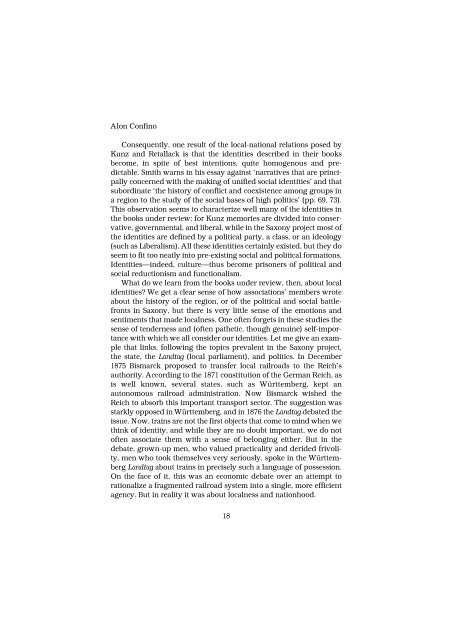Download - German Historical Institute London
Download - German Historical Institute London
Download - German Historical Institute London
You also want an ePaper? Increase the reach of your titles
YUMPU automatically turns print PDFs into web optimized ePapers that Google loves.
Alon Confino<br />
Consequently, one result of the local-national relations posed by<br />
Kunz and Retallack is that the identities described in their books<br />
become, in spite of best intentions, quite homogenous and predictable.<br />
Smith warns in his essay against ‘narratives that are principally<br />
concerned with the making of unified social identities’ and that<br />
subordinate ‘the history of conflict and coexistence among groups in<br />
a region to the study of the social bases of high politics’ (pp. 69, 73).<br />
This observation seems to characterize well many of the identities in<br />
the books under review: for Kunz memories are divided into conservative,<br />
governmental, and liberal, while in the Saxony project most of<br />
the identities are defined by a political party, a class, or an ideology<br />
(such as Liberalism). All these identities certainly existed, but they do<br />
seem to fit too neatly into pre-existing social and political formations.<br />
Identities—indeed, culture—thus become prisoners of political and<br />
social reductionism and functionalism.<br />
What do we learn from the books under review, then, about local<br />
identities? We get a clear sense of how associations’ members wrote<br />
about the history of the region, or of the political and social battlefronts<br />
in Saxony, but there is very little sense of the emotions and<br />
sentiments that made localness. One often forgets in these studies the<br />
sense of tenderness and (often pathetic, though genuine) self-importance<br />
with which we all consider our identities. Let me give an example<br />
that links, following the topics prevalent in the Saxony project,<br />
the state, the Landtag (local parliament), and politics. In December<br />
1875 Bismarck proposed to transfer local railroads to the Reich’s<br />
authority. According to the 1871 constitution of the <strong>German</strong> Reich, as<br />
is well known, several states, such as Württemberg, kept an<br />
autonomous railroad administration. Now Bismarck wished the<br />
Reich to absorb this important transport sector. The suggestion was<br />
starkly opposed in Württemberg, and in 1876 the Landtag debated the<br />
issue. Now, trains are not the first objects that come to mind when we<br />
think of identity, and while they are no doubt important, we do not<br />
often associate them with a sense of belonging either. But in the<br />
debate, grown-up men, who valued practicality and derided frivolity,<br />
men who took themselves very seriously, spoke in the Württemberg<br />
Landtag about trains in precisely such a language of possession.<br />
On the face of it, this was an economic debate over an attempt to<br />
rationalize a fragmented railroad system into a single, more efficient<br />
agency. But in reality it was about localness and nationhood.<br />
18













